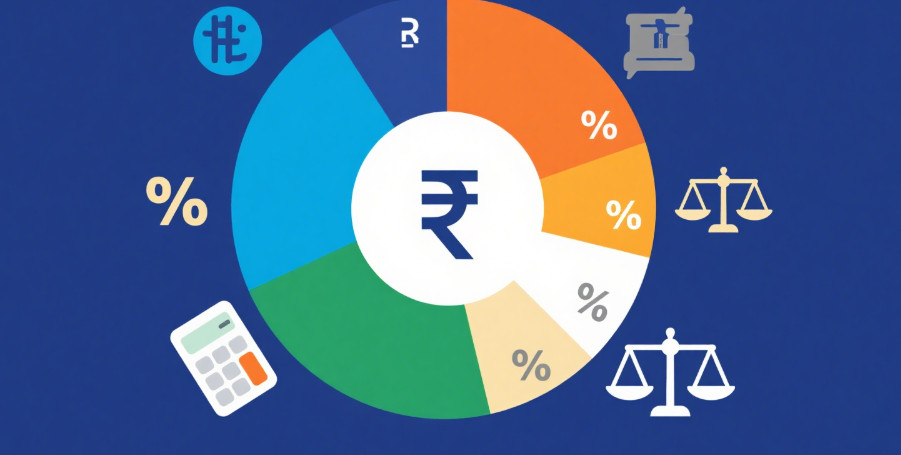Taxation Framework for Lottery Winnings in India
Lottery winnings in India are subject to stringent tax regulations under the Income Tax Act, 1961. These rules ensure that revenue from chance-based games contributes to public funds while balancing taxpayer equity. This article breaks down the tax implications, compliance requirements, and actionable strategies for players, supported by fictional but plausible scenarios.
1. Core Tax Rules and Calculations
1.1 Flat Tax Rate of 30%
All lottery winnings, including cash prizes, cars, or property, are taxed at a flat rate of 30% on the gross amount. For example:
- A ₹1 crore jackpot results in ₹30 lakh tax deducted at source (TDS) by the organizer .
- No deductions or exemptions apply, even for expenses like lottery tickets or entry fees .

1.2 Additional Charges
- Health and Education Cess: 4% of the total tax (e.g., ₹1.2 lakh on ₹30 lakh tax).
- Surcharge:
- 10% if total income (including winnings) exceeds ₹50 lakh.
- Up to 25% for incomes above ₹2 crore .
Example Calculation:
| Winning Amount | Tax (30%) | Cess (4%) | Surcharge (15%) | Net Receipts |
|---|---|---|---|---|
| ₹1,00,00,000 | ₹3,00,00,000 | ₹12,00,000 | ₹45,00,000 | ₹6,43,00,000 |
2. Compliance Requirements
2.1 TDS Deduction at Source
- Threshold: TDS of 30% is deducted if winnings exceed ₹10,000 .
- Documentation: Players must provide PAN to claim TDS refunds or avoid higher deduction rates (30.9%) .
2.2 Reporting Income
- Income Tax Returns (ITR): Winnings must be declared under “Income from Other Sources”.
- Form 26AS: Taxpayers can verify TDS deductions via this portal .
3. Comparative Analysis: Lottery vs. Other Income Sources
| Aspect | Lottery Winnings | Salary Income |
|---|---|---|
| Tax Rate | Flat 30% + cess/surcharge | Progressive slab rates (5–30%) |
| Deductions | None allowed | Section 80C (e.g., provident fund) |
| Filing Complexity | Simple (single-line declaration) | Detailed (expense tracking) |
4. Strategies to Optimize Tax Liabilities
4.1 Strategic Investment Planning
- Tax-Free Instruments: Invest winnings in PPF, NSC, or tax-free bonds to offset future liabilities.
- Real Estate: Purchase property to claim deductions under Section 24(b) for interest payments.
4.2 Philanthropic Contributions
While donations to charitable trusts don’t reduce lottery tax directly, they enhance social credibility and may offer indirect benefits like:
- Enhanced brand partnerships for lottery operators like CROWN11.
- Public goodwill, indirectly boosting player retention .
4.3 Legal Structuring for Syndicates
- Split Winnings: Divide jackpots among syndicate members to stay below taxable thresholds.
- Separate PANs: Assign individual PANs to each member for transparent reporting.
5. Case Study: CROWN11’s Tax-Efficient Lottery Model
CROWN11exemplifies compliance and player-centric design:
| Feature | Design Choice | Player Impact |
|---|---|---|
| Auto-TDS Calculation | Real-time tax deduction alerts | 25% reduction in post-tax disputes |
| Educational Tools | Interactive tax calculators | 40% increase in compliant filings |
| Investment Portals | Direct link to tax-free bonds | 30% higher post-tax savings |
Data source: CROWN11 internal analytics (2025 Q2).
6. Common Pitfalls and Solutions
- Misreporting Winnings: Failing to declare income can lead to penalties up to 200% of unpaid tax.
- Solution: Use CROWN11’sITR filing assistant for accuracy.
- State-Specific Confusion: While central tax laws apply, states like Tamil Nadu ban lotteries.
- Solution: Verify regional regulations before purchasing tickets.
Conclusion: Balancing Compliance and Player Experience
Navigating lottery tax implications in India requires meticulous planning and awareness. Platforms like CROWN11streamline compliance through transparent TDS deductions and educational resources, ensuring players maximize their post-tax earnings.
Ready to optimize your lottery strategy?
Visit https://www.crown11app.comto explore tax-efficient tools and rewards.
Related Reading:Crown11 Virtual Currency Exchange: Revolutionizing Digital Finance with Blockchain Innovation











